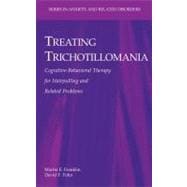
What is included with this book?
| Preface | p. v |
| Acknowledgements | p. ix |
| Overview and Assessment | |
| Trichotillo-What? Definition, Epidemiology & Impairment | p. 3 |
| Putting it Together: A Biopsychosocial Theory of Trichotillomania and Body-Focused Impulse Control Disorders | p. 15 |
| What it is and What it Isn't: Diagnostics, Differential Diagnosis, and Review of Clinical Measures | p. 25 |
| Doing the Detective Work: Comprehensive Assessment of TTM | p. 39 |
| What Should Be Done?: Presentation of Treatment Alternatives | p. 51 |
| What Do We Need to Know?: Frequently and Infrequently Asked Questions | p. 61 |
| Treatment: Core Elements | |
| You Can't Fight What You Can't See: Awareness Training and Self-Monitoring | p. 69 |
| Speed Bumps: Stimulus Control | p. 81 |
| Active Strategies for Active Hands: Competing Response Training | p. 91 |
| Holding the Lead: Maintenance | p. 101 |
| Treatment: Adjunctive Modules: Introduction to Part 3: Modules | |
| I'm not Sure If I'm Ready: Motivational Enhancement | p. 117 |
| Calming Down: Module 2: Relaxation and Other Stress-Management Strategies | p. 125 |
| Changing Your Thinking: Module 3: Cognitive Restructuring | p. 135 |
| When Other Problems are Also Present: Module 4: Clinical Management of Comorbid Problems | p. 151 |
| Attending to the Context: Module 5: Family-Based Approaches | p. 161 |
| Getting Support: Module 6: Group Therapy and Other Methods to Improve Access to Care | p. 173 |
| Resources for Clinicians, Patients, and Families | |
| List of Professional and Informational Sources for Clinicians, Patients and Families | p. 181 |
| Functional Assessment of Trichotillomania | p. 183 |
| References | p. 191 |
| Index | p. 207 |
| Table of Contents provided by Ingram. All Rights Reserved. |
The New copy of this book will include any supplemental materials advertised. Please check the title of the book to determine if it should include any access cards, study guides, lab manuals, CDs, etc.
The Used, Rental and eBook copies of this book are not guaranteed to include any supplemental materials. Typically, only the book itself is included. This is true even if the title states it includes any access cards, study guides, lab manuals, CDs, etc.